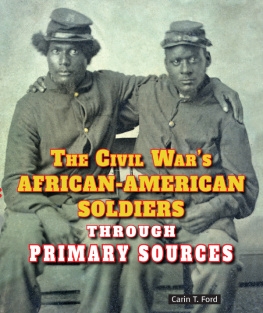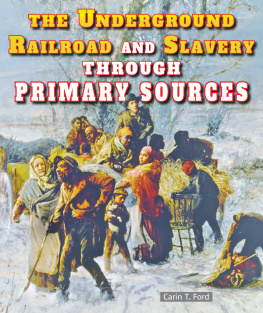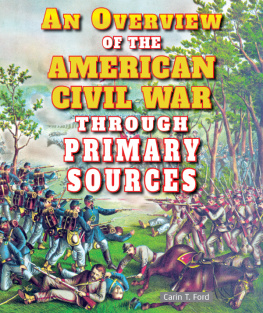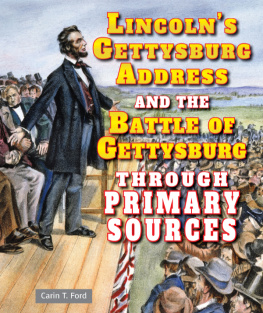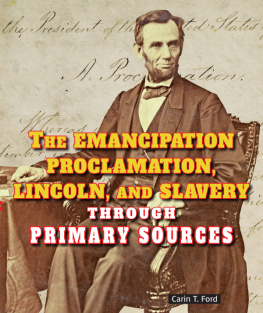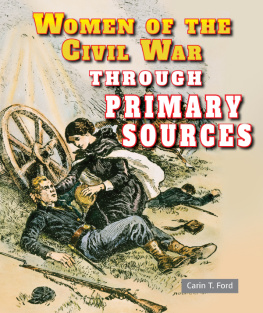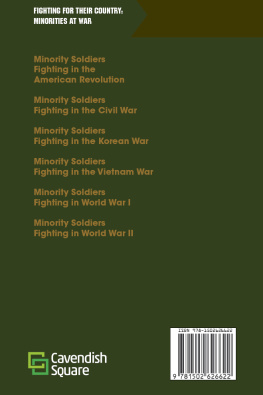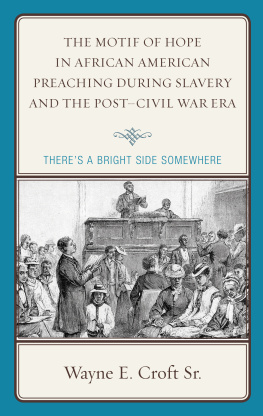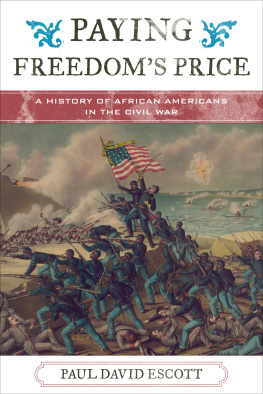Fighting for Freedom!
The Civil War began as a struggle to reunite a divided nation. But it became a fight to end slavery. For African-American soldiers, the cause was always greaterfreedom. African Americans had been enslaved in the United States for more than two hundred years. Slavery had fractured the nation into two parts, North and South. In brilliant primary sources, author Carin T. Ford explores the brave African-American soldiers who helped the Union win the Civil War, unify a nation, and abolish slavery forever.
About the Author
Carin T. Ford has been writing professionally for more than twenty-five years, including many books for Enslow Publishers, Inc. In addition to writing, she teaches English and journalism at colleges in the Philadelphia area.

Image Credit: Library of Congress Prints and Photographs
In this illustration, the Fifty-fourth Massachusetts Regiment storms Fort Wagner in July 1863. The Fifty-fourth regiment was one of the first all-black units fighting in the Civil War.
Six hundred Union soldiers raced toward Fort Wagner in South Carolina. The men were wet, tired, and hungry. It was July 1863, and the Fifty-fourth Massachusetts Regiment was one of the first units of African-American soldiers fighting in the Civil War. One soldier carried the Union flag, showing that the men were fighting for the North. Colonel Robert Gould Shaw had told his soldiers to take the fort or die there. The men promised to try. Yet, inside the fort, nearly three times as many Confederate soldiers were waiting with guns and cannons.
Bullets flew, and the Union soldiers fell, one after another. The soldier holding the Union flag was shot. Quickly, Sergeant William H. Carney reached out and grabbed the flag. As the regiment was ordered back to camp, Carney ran through a storm of bullets. He was shot in the head, chest, arm, and legbut he did not let go of the flag.
The old flag never touched the ground, Carney said proudly when he was safely back at camp with his unit.
The charge on Fort Wagner was a defeat for the North. The regiment lost almost half its men, including Colonel Robert Shaw. But the soldiers of the Fifty-fourth did not feel defeated. They had shown their courage. They had proved that black men could be soldiers.

When the Civil War broke out in April 1861, very few people thought African Americans should be allowed to fight. It was called a white mans war, meaning it was up to whites to serve in the army and navy. Yet the war had everything to do with black Americans.
There had been slavery in the United States for nearly 250 years. It had begun when a Dutch ship brought twenty African slaves to Virginia in 1619. By the outbreak of the Civil War, there were close to 4 million slaves in the country. These people had no rights. They were bought and sold like property. Many slaves were torn away from their families, beaten, whipped, and half-starved.
* The North was also known as the Union, or the United States. The people there were often called Yankees.
* The South was called the Confederate States, or the Confederacy. During the war, Southerners were also called Rebels or Johnny Reb.
Most slaves lived in the South. Tobacco, rice, sugarcane, and cotton grew well there. The slaves worked from sunrise to sunset planting, plowing, and harvesting the crops. After the cotton gin was invented in 1793, the demand for slaves skyrocketed. The cotton gin was a machine that removed the seeds from the cotton. Fifty times more cotton could be cleaned each dayand farmers could make even more money selling cotton. On their huge plantations, Southern farmers used slaves to produce nearly two-thirds of all the cotton grown in the world.

Image Credit: Library of Congress Prints and Photographs
A group of slaves stands for a portrait on Smiths Plantation in Beaufort, South Carolina, in 1862. Southern plantation owners claimed that they needed slaves to grow their cotton or the thriving industry in the South would collapse.
People in the United States had different opinions about slavery. Most Southerners believed they needed slaves to grow cotton. In the North, the businesses and small farms did not depend on slave labor. Many Northerners began to say that it was wrong for one person to own another person.
In November 1860, Abraham Lincoln was elected president. By then, one out of every seven Americans was a slave. Lincoln had often spoken out against slavery. As president, would he put an end to it?
People in the South were worried. They did not think the government in Washington, D.C., had the right to tell them what to do about slavery. Southerners said each state should be able to decide for itself.

Image Credit: Enslow Publishers, Inc.
This map shows the division of the Union states and Confederate states during the Civil War.

Image Credit: Library of Congress Prints and Photographs
Abraham Lincoln sits for a portrait on August 13, 1860. Although President Lincoln was outspoken against slavery, his initial reason for fighting the Civil War was to reunite the nation. African Americans, however, hoped the war would end slavery.
South Carolina secededor broke awayfrom the rest of the country in December 1860. Soon, six more Southern states followed: Mississippi, Florida, Alabama, Georgia, Louisiana, and Texas. Together, they formed a new country. They called it the Confederate States of America.
On April 12, 1861, Confederate soldiers fired on Fort Sumter in South Carolina. The United States soldiers surrendered the fort to the Confederates. The North and the South were at war. After that, four more slave states joined the Confederacy: Virginia, Arkansas, Tennessee, and North Carolina.
President Lincoln called for 75,000 volunteers to serve in the Union army and fight for the United States of America. He said he would not allow the nation to be split in two. The Civil War began as a fight to put the country back together. But African Americans hoped that a war between North and South would also put an end to slaveryand they wanted to take part in it.
Frederick Douglass was an ex-slave who became famous as a speaker and writer against slavery. He told African-American men and women to fight for their freedom. I urge you to fly to arms, Douglass said. This is your golden opportunity.
Still, the U.S. War Department continued to turn away African Americans. Many white Northerners thought slavery was wrong, but they did not think black people were equal to whites. They did not want to fight side by side with black soldiers.

Image Credit: Library of Congress Prints and Photographs

